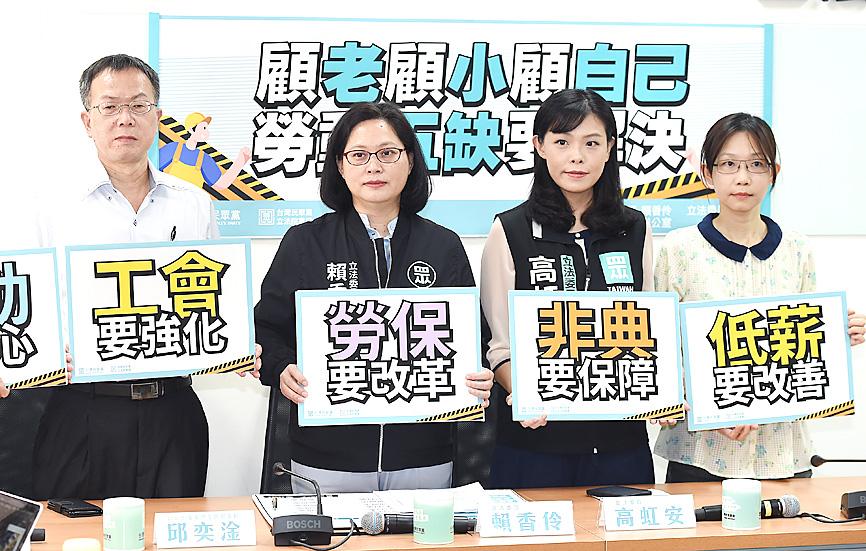Taiwan People’s Party (TPP) Legislator Lai Hsiang-ling (賴香伶) yesterday called Taiwan’s low wages “a national disgrace,” and demanded that the government improve working conditions and raise the minimum wage.
Lai was speaking at a news conference at the TPP caucus office at the Legislative Yuan in Taipei, which was also attended by representatives of the Taipei Art Creators’ Union and Taipei Confederation of Trade Unions.
Taiwan’s labor conditions fall short with regard to labor insurance, protection for atypical workers, the minimum wage, the health of labor unions and peace of mind for workers, Lai said.

Photo: Liao Chen-huei, Taipei Times
The country’s unemployment rate rose to 4 percent after the COVID-19 outbreak last year, causing much hardship, she said.
When the country’s industries complained about the so-called “five resource shortfalls” of land, water, electricity, talent and labor, the government set up a special office to address their needs, she said, adding that workers deserve the same treatment.
The government has to shore up the labor insurance fund before it becomes insolvent, which critics have said could occur in 2026, she said.
The injection of NT$22 billion (US$788.4 million) is not adequate, because the fund’s fiscal woes are worsening due to an aging tax base, she said.
The TPP caucus has proposed that workers be given 14 days of paid leave for child and elderly care per year to ease the burden on working families, which the government should support, Lai said.
The Ministry of Labor should introduce a minimum wage bill as soon as possible, as President Tsai Ing-wen (蔡英文) ran for office on a platform that supported increasing the wages of Taiwanese workers, she added.
The country’s laws do not sufficiently protect creative industry workers from overwork, intellectual property theft or exploitation, Taipei Art Creators’ Union vice president Tu Pei-shih (杜珮詩) said.
Citing a study by her union, Tu said that 48 percent of creators make less than NT$30,000 per month, less than 50 percent of them are enrolled in the labor insurance program and only 27 percent work under a formalized written contract.
TPP Legislator Kao Hung-an (高虹安) said that the party caucus has proposed amendments to the Culture and Arts Reward Act (文化藝術獎助條例), which would bolster the rights of creative industry workers and expand their participation in labor insurance.
Unreasonable regulations are to blame for Taiwan’s low unionization rate, which has remained at 7.6 percent for many years, Confederation of Taipei Trade Unions president Chiu I-kan (邱奕淦) said.
Thirty workers are needed to organize a legally recognized union in Taiwan, which is a more demanding standard than the two workers required in South Korea, seven in Hong Kong and 25 in China, he said, adding that the membership threshold should be lowered.
Other restrictions on the unionization of contract workers and a lack of collective bargaining rights have also severely hindered the growth of industrial unions, he added.
Additional reporting by CNA

Trips for more than 100,000 international and domestic air travelers could be disrupted as China launches a military exercise around Taiwan today, Taiwan’s Civil Aviation Administration (CAA) said yesterday. The exercise could affect nearly 900 flights scheduled to enter the Taipei Flight Information Region (FIR) during the exercise window, it added. A notice issued by the Chinese Civil Aviation Administration showed there would be seven temporary zones around the Taiwan Strait which would be used for live-fire exercises, lasting from 8am to 6pm today. All aircraft are prohibited from entering during exercise, it says. Taipei FIR has 14 international air routes and

The Ministry of National Defense (MND) today released images of the military tracking China’s People's Liberation Army (PLA) movements during the latest round of Chinese drills around Taiwan. The PLA began "Justice Mission 2025" drills today, carrying out live-fire drills, simulated strikes on land and maritime targets, and exercises to blockade the nation's main ports. The exercises are to continue tomorrow, with the PLA announcing sea and air space restrictions for five zones around Taiwan for 10 hours starting from 8:30am. The ministry today released images showing a Chinese J-16 fighter jet tracked by a F-16V Block 20 jet and the

City buses in Taipei and New Taipei City, as well as the Taipei MRT, would on Saturday begin accepting QR code payments from five electronic payment providers, the Taipei Department of Transportation said yesterday. The new option would allow passengers to use the “transportation QR code” feature from EasyWallet, iPass Money, iCash Pay, Jkopay or PXPay Plus. Passengers should open their preferred electronic payment app, select the “transportation code” — not the regular payment code — unlock it, and scan the code at ticket readers or gates, General Planning Division Director-General Liu Kuo-chu (劉國著) said. People should move through the

Snow fell on Yushan (Jade Mountain, 玉山) yesterday morning as a continental cold air mass sent temperatures below freezing on Taiwan’s tallest peak, the Central Weather Administration (CWA) said. Snowflakes were seen on Yushan’s north peak from 6:28am to 6:38am, but they did not fully cover the ground and no accumulation was recorded, the CWA said. As of 7:42am, the lowest temperature recorded across Taiwan was minus-5.5°C at Yushan’s Fengkou observatory and minus-4.7°C at the Yushan observatory, CWA data showed. On Hehuanshan (合歡山) in Nantou County, a low of 1.3°C was recorded at 6:39pm, when ice pellets fell at Songsyue Lodge (松雪樓), a